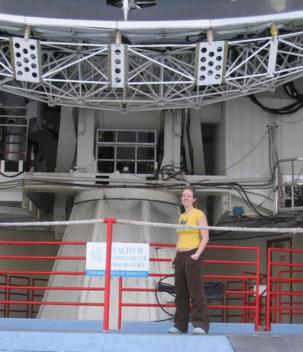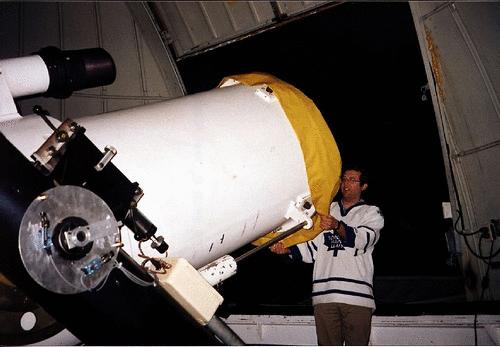Graduate Work in Astronomy/Astrophysics |
[Jump to faculty list] |
From the intricate gravitational dance of objects in our Solar System, to the hidden songs of the Big Bang's echoes encoded in the cosmic microwave background, UBC astronomers and astrophysicists study our universe at all scales and use facilities covering all wavelengths. Graduate students in the department have access to expert training in the entire range of astronomical disciplines.
UBC graduate students have consistently garnered top national prizes for their oral and poster presentations at the Canadian Astronomical Society meeting. UBC graduate students travel widely to international astronomical meetings and to telescope facilities around the world. Students will find an active and diverse academic and social environment in our program; we are committed to training students in the skills and techniques to become world-class researchers.

Degree programs
The Department of Physics and Astronomy at UBC offers graduate degrees in
| M.Sc. (Astronomy) | M.Sc. (Physics) |
| Ph.D. (Astronomy) | Ph.D. (Physics) |
where a common path is to take two years in an M.Sc. degree and then three years for the subsequent Ph.D. degree. All of these degrees require a written research thesis; however, both M.Sc. degrees allow the option to transfer into the Ph.D. degree after one year of UBC residency in the M.Sc. degree and completion of 12 credits of 500-level coursework (with a >85% average).
Several students in the department are pursuing research in astronomy and astrophysics while enrolled in the Physics degrees (the only difference is the required coursework). Many of the students in our Astronomy degrees enter with pure physics backgrounds.
Students in the M.Sc. program have a research supervisor. Those in the PhD program assemble a full supervisory committee and must pass a qualifying exam.
M.Sc. and PhD application procedures
Information regarding application procedures to all four of the above degrees can be found at the department's graduate program web page. We highly encourage students to apply as soon as they have their grades from the first half of their final year in their current (usually undergraduate) program; usually one should apply in January of the year they wish to start their degree (in September).
Admitted students have the assurance of guaranteed financial support of up to 5 years (two years for M.Sc. and 3 years for PhD). More information about support and awards is available from the main departmentatal support web page.
Courses
Graduate students usually take both astronomy and physics coursework at the
beginning of their degrees.
Recent course offerings in Astronomy can be found at the departmental
Graduate Course listing.
Students in astronomy degrees must take PHYS 500 and ASTR 520 unless
their taking of a similar course elsewhere is accepted by the department.
An M.Sc. student must succeed at 18 credits (roughly 6
courses), and a PhD student a further 12 credits (usually 4 courses).
Other coursework is decided upon in conjunction with the student's
thesis advisor and (for PhD students) doctoral supervision committee.
The courses ASTR 500, 502, 503, 504, 505, PHYS 504, PHYS 516, and
571 are generally recommended if the student does not have a
senior-level undergraduate course in the same topic.
The astronomy courses 502, 504, 505, 506, 507 are only taught
every three years.

What about a thesis supervisor?
Although some students seek to determine a thesis supervisor before arriving in the M.Sc. degree (this is a requirement for the PhD degree), many students enter the M.Sc. program and choose a supervisor after arrival and meeting our faculty members; the choice of a supervisor should occur within the first 4 months of arriving at UBC.
Students looking for a thesis supervisor can learn abut the research each of our faculty members is doing by browsing the "Astro-group" faculty pages below. Many of these pages will have the golden icon above, which will lead directly to listings of available projects.
Alphabetical list of Faculty in Astronomy & Astrophysics Research |
|||
| Name | Position | Field | Research Interests |
|---|---|---|---|
| Brett Gladman | Professor | Planetary Sciences |
Observational and theoretical planet formation and evolution. |
| Mark Halpern | Professor | Cosmology | Experimental cosmology. |
| Jeremy S. Heyl | Associate Professor | Astronomy/Theoretical Physics | High-Energy Astrophysics of Compact Objects, Cosmology, Strong-field QED |
| Paul Hickson | Professor, Graduate Chair | Astrophysics | Observational extragalactic astronomy, instrumentation |
| Jaymie Matthews | Professor | Stellar astrophysics | Stellar astrophysics, stellar pulsation and asteroseismology |
| Harvey Richer | Professor | Astronomy | Stellar populations, star clusters white dwarfs |
| Douglas Scott | Professor | Cosmology | Structure formation, Cosmic Microwave Background, Early Universe, Sub-mm Observations |
| Kris Sigurdson | Assistant Professor | Astroparticle Physics/Cosmology | Astroparticle Physics and Cosmology |
| Ingrid Stairs | Associate Professor | Radio Astronomy | Radio Pulsars, searches and long-term timing |
| Ludovic Van Waerbeke | Associate Professor | Cosmology | Dark Matter, Dark Energy, Strucrure Formation and Cosmology |
OTHER FACULTY |
|||
| Philip Gregory | Professor Emeritus | Astronomy | Bayesian Statistics applied to extrasolar planets, high energy astrophysics and non linear model fitting. |
| William H. McCutcheon | Professor Emeritus | Radio Astronomy | Galactic radio astronomy |
| Takamasa Momose | Associate Member | Atomic, Molecular and Optical Physics (AMO) /Astronomy & Astrophysics | Laser Spectroscopy/Astrochemistry of cold molecules, low temperature molecular physics and chemistry |
| Jasper Wall | Adjunct Professor | Observational Cosmology | Origin and Evolution of Galaxies, Active Galactic Nuclei, Unified Models, Statistics in Astronomy |
Life as a UBC graduate student
Vancouver is consistently rated amongst the world's top three cities in which to live. Those who like outdoor activities (hiking, skiing, and water sports) are in luck, but Vancouver also has an exciting annual series of international festivals of culture, music, cinema, and theater.
The astronomy group's graduate students are grouped in a set of
offices with a common area, allowing strong interaction with your
colleages. The group has a weekly lunch to discuss news related
to `all things astro'.
There are weekly departmental colloquia in both astronomy
(Mondays) and Physics (Thursdays) as well as a plethora of
weekly seminars and journal clubs in a variety of sub-topics
in physics and astronomy.
 |

|
"Kristen Coppin at the CalTech Submillimeter Observatory" |
Jason Rowe removing the dust cap at the Dominion Astrophysical Observatory |
